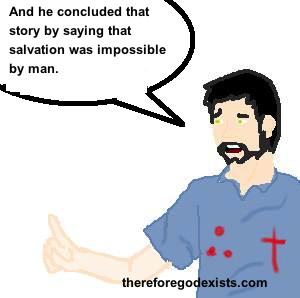 Simul Justus et Peccator. We are simultaneously justified and sinners. This is one of the great expressions of the reformation that sought to crystalize the biblical data concerning our justification and our sanctification. There is a sense in which our sins have been remitted (Acts 2:38), wiped away (Acts 3:19), washed away (Acts 22:16), we are credited as righteous (Romans 4:5) and yet we are still sinful creatures. We still struggle against the flesh and seek to crucify the flesh. In this way, it can be said that we are saved (justified) being saved (sanctified) and going to be saved (glorified). Christians are justified sinners. But a semi-popular Pelagian known as Kerrigan Skelly has denied this model. He suggests that it is impossible for a true Christian to sin – ever. He thinks that a true Christian will never sin. Is he right to deny the common model? Is it possible for a true Christian to sin? A response to Kerrigan Skelly follows.
Simul Justus et Peccator. We are simultaneously justified and sinners. This is one of the great expressions of the reformation that sought to crystalize the biblical data concerning our justification and our sanctification. There is a sense in which our sins have been remitted (Acts 2:38), wiped away (Acts 3:19), washed away (Acts 22:16), we are credited as righteous (Romans 4:5) and yet we are still sinful creatures. We still struggle against the flesh and seek to crucify the flesh. In this way, it can be said that we are saved (justified) being saved (sanctified) and going to be saved (glorified). Christians are justified sinners. But a semi-popular Pelagian known as Kerrigan Skelly has denied this model. He suggests that it is impossible for a true Christian to sin – ever. He thinks that a true Christian will never sin. Is he right to deny the common model? Is it possible for a true Christian to sin? A response to Kerrigan Skelly follows.
 It should be noted that what Mr Skelly is not saying is that people can go their entire lives without ever sinning. He thinks that everybody has sinned at some point, and therefore it could be said by him that “All have sinned and fall short of the glory of God.” (Romans 3:23). Rather, Mr Skelly is advocating the position of full sanctification or perfectionism. This is the view that once we become Christians, then we will never sin. So if you have been a Christian for five years, it will follow that you have not sinned in five years. Is this what the Bible says? A response to Kerrigan Skelly’s perfectionism follows.
It should be noted that what Mr Skelly is not saying is that people can go their entire lives without ever sinning. He thinks that everybody has sinned at some point, and therefore it could be said by him that “All have sinned and fall short of the glory of God.” (Romans 3:23). Rather, Mr Skelly is advocating the position of full sanctification or perfectionism. This is the view that once we become Christians, then we will never sin. So if you have been a Christian for five years, it will follow that you have not sinned in five years. Is this what the Bible says? A response to Kerrigan Skelly’s perfectionism follows.
 We are commanded to be righteous. Throughout the biblical narrative, Jesus and the apostles command their people to leave unrighteousness behind. In his presentations of perfectionism, Mr Skelly will blast a shotgun of verses that elucidate the biblical principle of living in righteousness. Since we are supposed to live in righteousness, Mr Skelly reasons, it follows that if we commit a single sin, then we are living in unrighteousness. He would appeal to a verse like Matthew 7:17-18, which reads, “A good tree produces good fruit, and a bad tree produces bad fruit. A good tree can’t produce bad fruit, and a bad tree can’t produce good fruit.”
We are commanded to be righteous. Throughout the biblical narrative, Jesus and the apostles command their people to leave unrighteousness behind. In his presentations of perfectionism, Mr Skelly will blast a shotgun of verses that elucidate the biblical principle of living in righteousness. Since we are supposed to live in righteousness, Mr Skelly reasons, it follows that if we commit a single sin, then we are living in unrighteousness. He would appeal to a verse like Matthew 7:17-18, which reads, “A good tree produces good fruit, and a bad tree produces bad fruit. A good tree can’t produce bad fruit, and a bad tree can’t produce good fruit.”
 The question that I would pose to Mr Skelly is whether he thinks that the person who is unregenerate will be incapable of doing something good throughout their lifetime. Since he also denies that we have original sin, there would be nothing to prevent the bad tree from bringing forth at least some good fruit. A person who is not saved might donate to charity or give up their jacket. Thus there is some good fruit. But the general assessment of the fruit is that it is bad. If an unsaved person can do one or two good things, then why is it unthinkable that a saved person could sin, considering this parallel?
The question that I would pose to Mr Skelly is whether he thinks that the person who is unregenerate will be incapable of doing something good throughout their lifetime. Since he also denies that we have original sin, there would be nothing to prevent the bad tree from bringing forth at least some good fruit. A person who is not saved might donate to charity or give up their jacket. Thus there is some good fruit. But the general assessment of the fruit is that it is bad. If an unsaved person can do one or two good things, then why is it unthinkable that a saved person could sin, considering this parallel?
 The context of the command to righteousness cannot be overlooked. Jesus was faced with religious hypocrisy. The religious leaders would pretend that they were righteous when they were really just self-serving. So Jesus emphasized the centrality of true righteousness as opposed to the mere appearance of righteousness. This manifests in Luke 18:9-14, as we see the parable of the Pharisee and the tax collector. The Pharisee claims that he is a good person and that he has no sin, and the tax collector admits his sin before God. It is the tax collector, not the Pharisee, who goes home justified. Christians are called to have a righteousness that surpasses that of the Pharisees; a true righteousness, one that hungers and thirsts after righteousness. For the Beatitudes say, “Blessed are those who hunger and thirst for righteousness, for they shall be satisfied.” (Matthew 5:6). It is not the righteous who are blessed, but those who hunger and thirst for righteousness. Is it possible for a true Christian to sin? A response to Kerrigan Skelly seems to indicate that it is.
The context of the command to righteousness cannot be overlooked. Jesus was faced with religious hypocrisy. The religious leaders would pretend that they were righteous when they were really just self-serving. So Jesus emphasized the centrality of true righteousness as opposed to the mere appearance of righteousness. This manifests in Luke 18:9-14, as we see the parable of the Pharisee and the tax collector. The Pharisee claims that he is a good person and that he has no sin, and the tax collector admits his sin before God. It is the tax collector, not the Pharisee, who goes home justified. Christians are called to have a righteousness that surpasses that of the Pharisees; a true righteousness, one that hungers and thirsts after righteousness. For the Beatitudes say, “Blessed are those who hunger and thirst for righteousness, for they shall be satisfied.” (Matthew 5:6). It is not the righteous who are blessed, but those who hunger and thirst for righteousness. Is it possible for a true Christian to sin? A response to Kerrigan Skelly seems to indicate that it is.
 An unclean man among unclean men. Being confronted with the perfect holiness of Christ will expose the sins of men. Those of us who think ourselves holy will be offended by the one who sits on the throne. Surrounding him are those blessed seraphim who sing for eternity, “Holy, Holy, Holy, is the Lord of hosts, the whole earth is full of His glory.” (Isaiah 6:4). Though we think ourselves righteous, when the light emerges, it exposes our deeds, for they are evil. As John 3:19 reads, “The Light has come into the world, but men loved darkness more than light, because their deeds were evil.” Men hated Jesus Christ because in his perfect holiness he exposed their deeds. When men are confronted by the holiness of Christ, their sin shines forth and they can think of nothing else but to flee, to call out for the mountains to bury them or to throw themselves upon his mercy.
An unclean man among unclean men. Being confronted with the perfect holiness of Christ will expose the sins of men. Those of us who think ourselves holy will be offended by the one who sits on the throne. Surrounding him are those blessed seraphim who sing for eternity, “Holy, Holy, Holy, is the Lord of hosts, the whole earth is full of His glory.” (Isaiah 6:4). Though we think ourselves righteous, when the light emerges, it exposes our deeds, for they are evil. As John 3:19 reads, “The Light has come into the world, but men loved darkness more than light, because their deeds were evil.” Men hated Jesus Christ because in his perfect holiness he exposed their deeds. When men are confronted by the holiness of Christ, their sin shines forth and they can think of nothing else but to flee, to call out for the mountains to bury them or to throw themselves upon his mercy.
 That is what we see when Isaiah encountered the one who sat upon the throne. Isaiah was the holiest man in Israel, chosen as a prophet, sanctified in the spirit. Yet when he saw Christ, he cried out, “Woe is me, for I am ruined! Because I am a man of unclean lips, And I live among a people of unclean lips; For my eyes have seen the King, the Lord of hosts.” (Isaiah 6:5). He instantly recognized how sinful he was before a holy and righteous God. We may be able to conceal our sins, to sear our conscience, but when we see Christ, it all spills out and we cry out “Woe is me, for I am undone.” Isaiah felt this way despite that his sin was already forgiven as the burning coal in verse seven symbolized. Is it possible for a true Christian sin? A response to Kerrigan Skelly suggests that even Isaiah, a holy prophet, was burdened by sin in his life.
That is what we see when Isaiah encountered the one who sat upon the throne. Isaiah was the holiest man in Israel, chosen as a prophet, sanctified in the spirit. Yet when he saw Christ, he cried out, “Woe is me, for I am ruined! Because I am a man of unclean lips, And I live among a people of unclean lips; For my eyes have seen the King, the Lord of hosts.” (Isaiah 6:5). He instantly recognized how sinful he was before a holy and righteous God. We may be able to conceal our sins, to sear our conscience, but when we see Christ, it all spills out and we cry out “Woe is me, for I am undone.” Isaiah felt this way despite that his sin was already forgiven as the burning coal in verse seven symbolized. Is it possible for a true Christian sin? A response to Kerrigan Skelly suggests that even Isaiah, a holy prophet, was burdened by sin in his life.
The same could be said of Abraham, Isaac, and Jacob, who all exhibited a range of sins throughout their life of obedience. They lied (Genesis 20:2), esteemed themselves more highly than others (Genesis 27:36), failed to put their trust in the promises of God (Genesis 16:4), etc, etc. Likewise, God declared that Job was righteous (Job 1:1), but he was still a sinner that needed to be perfected. For his lack of faith in God’s righteousness was what warranted the magnificent theodicy that we see in chapters 38-42. He was guilty of darkening the council of God’s wisdom by speaking without knowing what he was talking about (Job 38:2). He was a sinner and yet he was righteous. This theme has emerged throughout the lives of the prophets.
Nobody is good but God alone. Jesus said to a rich young ruler, “Nobody is good but God alone.” (Mark 10:18) and then he told the man that if he wanted to inherit eternal life, he needed to keep the commandments, and he listed some of them. But this man did not walk away stimulated that his question was answered, but rather sad, because Jesus exposed his sin. The man thought that he was keeping these commandments. But Jesus pointed out his sin (Mark 10:21). Thus it seems that the soteriological clause spelled out by Jesus was not one that could be actualized. It was a standard that no man could meet. That is why Jesus said, “Nobody is good but God alone.”
This is underlined further as he told his disciples how difficult it is to enter the kingdom of God. He said (v. 25) “It is easier for a camel to go through the eye of a needle than for a rich man to enter the kingdom of God.” In this culture, riches were thought of as a sign of covenantal blessing. If you were rich, then you were certainly righteous enough to enter the kingdom. But Jesus undid this paradigm and said that it was impossible to enter the kingdom of God by your own righteousness. Deeply confused by this cataclysmic declaration, they ask, “Who, then, can be saved?” If it is so hard that it is like a camel going through the eye of a needle, then who can be saved? Jesus tells them, “It is impossible by man.” (v. 27). It is impossible for man to be saved by his own righteousness. But he tells them, “But it is possible with God.” Is it possible for a true Christian to sin? A response to Kerrigan Skelly reveals that true Christians sin. Everybody sins. Nobody is good but God alone.
“If we say that we have no sin, we are deceiving ourselves and the truth is not in us.” 1 John 1:8 John the elder wrote his letter to guard the church against sin (1 John 2:1). His letter is often used as a measuring stick to determine whether a person is in the faith. If they walk in sin, unable to control themselves, if they leave the church, if they deny that Jesus Christ has come in the flesh, they have identified themselves as unbelievers. Likewise, if a person claims that they have no sin in their life at all, they are deceiving themselves and the truth is not in them. So he goes on to say that if we confess our sins, then God will forgive us (v. 9). John juxtaposes these two conditions, [1] the person who says they are without sin, hence refusing to confess and not receiving forgiveness and [2] the person who does confess and does receive forgiveness.
In response to this, My Skelly published a 30 minute video blasting another shotgun of verses in the first epistle of John wherein he tells his audience to not sin. The implication is that John would be contradicting himself if he told his people not to sin and then said that if you claim to have no sin, you are deceiving yourself. But consider the following propositions: [1] I am laboring to abstain from sin. [2] I need to acknowledge when I fail. John was elucidating both of these propositions. There is nothing inconsistent about this.
Further, this objection just does not change what the text says. Toward the end of his 30 minute video, Mr Skelly presented a 30 second treatment of the text of 1 John 1:8, suggesting that John was merely saying that if we have never sinned at all in our lives, then we are deceiving ourselves. But that would not make sense of the juxtaposition between the man who claims to have no sin (v. 8) and the man who asks for forgiveness (v. 9). It seems that there would be no reason for verse 9 to be present. Further, the condition that John speaks of us is present tense. Just as he said in verse 6, “we have fellowship with him,” so also he said in verse 8, “we have no sin.” This is a reflection of the present condition of the believer.
Further, and critically, John’s later explanation for his writing is quite telling. He writes, “I am writing these things to you so that you may not sin. And if anyone sins, we have an Advocate with the Father, Jesus Christ the righteous.” (1 John 2:1). John is trying to keep his people from sin, but if they do happen to sin, then Jesus Christ is advocating for them. Jesus Christ is advocating for sinners, that their sin may be forgiven and that they may have a restored relationship with the Father. But that is not to say that they lost their salvation. John told them that Jesus was advocating for them precisely because he wanted them to have the firmest of convictions that even when they sin, they are still saved because Jesus Christ is their advocate with the Father. Is it possible for a true Christian to sin? A response to Kerrigan Skelly seems to expose some of the exegetical mistakes that he made in denying that principle.
What about unintentional sins? Often people will sin without even realizing that they have sinned. We might do something or say something that we did not realize was a sin. So when we evaluate ourselves, our evaluation will be skewed because we might not even know that we have sinned. The Bible calls us to take every thought captive (2 Corinthians 10:5). How can we be sure that we have done that? It seems to me that there is always the terrifying possibility that we might forget or overlook a sin. If we forget or overlook a sin often, and our salvation depends upon our vigilance about sin, then we are in trouble. That is why the Jews gave sacrifices for unintentional sins (Leviticus 4:27).
In response to this, Mr Skelly concedes that the Jews committed unintentional sins. But, he argues, this was because there were so many laws – dietary laws, laws concerning fabric and rules that are amoral. Since they are amoral, they were very forgettable because they are not imprinted upon the human heart. But, now that these laws have passed away, unintentional sins have passed away with them. Now, all of our sins are recognized by the human conscience. The problem with Mr Skelly’s reasoning is that he is assuming that human beings have fully functioning noetic capabilities. He is assuming that our cognitive faculties and our moral intuitions are ideal. We always, without reservation, recognize right from wrong. This position seems unwarranted and a general reflection upon the experience of human life would suggest otherwise. There are often times when our moral intuitions fail. There are often times when we call evil, good, and good, evil. Look at society. Some people really think that it is morally praiseworthy to suction babies out of their mothers’ wombs limb by limb. This moral abomination is referred to as good. The appeal to the perfect human conscience then seems unjustified.
Mr Skelly goes on to argue that even if there were unintentional sins, that they are not really sins because you do not know about them. But this introduces the justification of every sort of immorality. The pro-choice advocate sometimes will not know that the fetus is the womb is human. A Nazi soldier will not have known that the Jews had intrinsic human value. Further, this objection forgets about the unintentional sins of the Jews. It also ignores the rich young ruler who did not know that his love of money was a sin (Mark 10:21). Ignorance of the law is no excuse. It seems to me that Mr Skelly has assessed that he is righteous because he has lowered the standard of righteousness. We can all be righteous if we lower the standard every time we sin. Is it possible for a true Christian sin? A response to Kerrigan Skelly reveals that Christians often sin accidentally. This is still a real sin that our flawed conscience might not always guard against.
Why does God allow us to continue in sin? This exercise of philosophical theology imposes some duties upon God. Mr Skelly argues that if God is going to command us to be righteous, then he has a duty to give us the capacity to attain that righteousness. I find that interesting. When? When does God have to bring us into perfect sanctification? Does God have to do it immediately? Does he have to make you perfectly righteous right now? Perhaps God has good reasons for not fulfilling your sanctification right now. Who are you, a man, to dictate the moral duties of God? Is it not God who has the divine prerogative to dictate moral duties to you?
It is possible that God has not wrought perfect sanctification in the heart of his people because he wanted them to have a constant and utter reliance upon him. He wanted people who would cry out, “Woe is me! I am undone, for I am an unclean man among unclean men!” Christians who struggle against sin are the ones who will declare of him who sits on the throne, “Holy, holy holy.” We are the ones who will not point the world to our righteousness but to the righteousness of the Lord Jesus Christ. But it seems to me that the perfectionist will point to himself and say, “Holy, holy, holy.”
Is it possible for a true Christian to sin? A response to Kerrigan Skelly has revealed that the reformed model of sanctification succeeds.
If you would like to get in on the discussion about this, join my Theology Discussion Group!